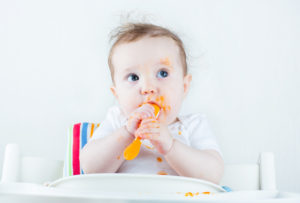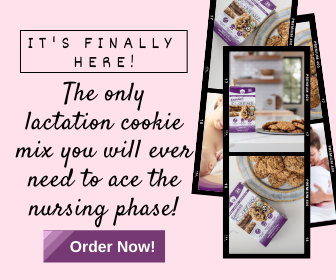For the first few months of your baby’s life, you won’t give much thought to his or her diet aside from troubleshooting breastfeeding and keeping track of wet and dirty diapers to ensure adequate milk intake. Many parents wonder when the appropriate time is to start their babies on solid food and if weaning will affect their breastfeeding relationship. There is no “one size fits all” type of answer, because it truly depends on the parent preferences for introduction to solid food, as well as the baby’s own breastfeeding habits. Some babies self wean, while others would prefer nursing well into the toddler years.
First, let’s explore the current guidelines for introducing solid foods to your baby.
According to the American Academy of Pediatrics, solid food should be introduced around six months of age, which lessens the chance for increased weight gain in infancy and early childhood. Babies should also be exposed to a variety of healthy foods and textures.
Keep in mind, too, that babies and toddlers are more likely to accept foods that they see siblings and parents eating. Babies are also encouraged to self-feed with fingers and spoons. Gone are the days where rice cereal is recommended right at his or her four-month birthday.
Kellymom, a terrific and thorough source for breastfeeding mom, states that babies do not need pureed foods if they’re beginning solids at or after the
age of six months. One feeding method that is gaining popularity is known as Baby Led Weaning, which is when a baby self-feeds table food from the start.
Parents are also encouraged to look for the developmental signs of readiness, such as the following:
- Baby sits well without support
- Baby has lost his or her tongue thrust reflex, which is when they push food to the front of the mouth and out
- Baby shows interest in chewing
- Baby is starting to develop the “pincer” grasp, where food and objects are picked up with the thumb and forefinger Now that we’ve discussed the introduction of solids, let’s touch upon how this relates to the breastfeeding baby.
The golden rule to remember is that “food before one is just for fun,” and that babies should continue to obtain their main source of nutrition from breastfeeding.

When your baby starts solids, you might notice a slight dip in your supply as food slowly becomes more of a source of nutrition for the baby – or you might not. Some babies show an interest in food right away, while others prefer to primarily breastfeed. Many women notice that if they’ve been exclusively breastfeeding, their periods return between six and twelve months of age as the baby starts drinking less milk.
One thing to note is that the introduction of solids does not signify the end of your breastfeeding relationship. Quite the opposite! Many babies continue to breastfeed well into their toddler years. The general thought is to allow your baby to wean when he or she is ready.

Don’t confuse weaning with a nursing strike, however. Babies that are ready to wean will usually do so slowly, over a period of time. If your baby is suddenly fussy at the breast or refusing it altogether, this could simply be a nursing strike. This can happen for a number of reasons, such as if you change your perfume and smell different to the baby, or if nursing is uncomfortable due to teething. You want to be patient and persistent to get the baby back to the breast, and always seek medical attention if you think the strike could be caused by an illness.
Many moms also choose to wean their babies for career reasons or to conceive another child. Breastfeeding is hard work, and some moms are ready for the journey to end for various personal reasons. This is perfectly ok; a fed baby is best, and what works for the family works best for the baby. Remember that food before age one, as a guideline, is not as important and wholesome for your baby as breast milk. Regardless of when you decide to start your baby on solid foods, continue to breastfeed as your baby’s primary source of nutrition.
Weaning is always a difficult and re leaving time for moms, but is should be a process just like you build your supply up you need to build it down too. Did you find that your baby did not want to give up the breast, or that he loved food and it was an easy process?





